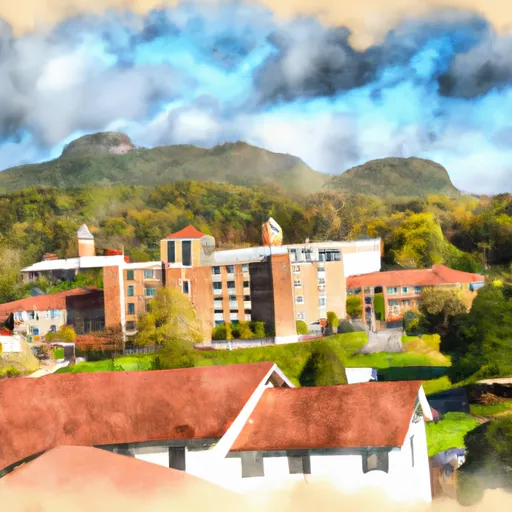-
 Snoflo Premium
Snoflo Premium
Get unlimited access to all our content
With no Ad interruptions! - Start Your Free Trial Login with existing account
Hiwassee-College
Eden Index
Climate
7.7
•
Recreation
7.6
•
Community
2.2
•
Safeguard
6.3/10

Hiwassee College is located in Madisonville, Tennessee, nestled in the beautiful foothills of the Great Smoky Mountains. The climate in this region is generally mild, with hot summers and cool winters. The area experiences an average annual rainfall of around 50 inches, contributing to the abundant hydrology constituents. The college is situated near the Hiwassee River, which offers a variety of recreational opportunities for outdoor enthusiasts.
The Hiwassee River is renowned for its excellent fishing, particularly for trout. Anglers can enjoy fly fishing or spin casting for various species, including rainbow and brown trout. Additionally, the river is popular for canoeing and kayaking, with its calm and scenic stretches attracting both beginners and experienced paddlers. The surrounding area offers numerous hiking trails that wind through the picturesque mountains, providing breathtaking views and opportunities to spot wildlife.
Outdoor enthusiasts at Hiwassee College can also explore nearby Cherokee National Forest, which offers a range of activities such as camping, hiking, horseback riding, and mountain biking. The forest is home to diverse flora and fauna, including black bears, deer, and wild turkeys.
In summary, Hiwassee College in Tennessee offers a favorable climate, rich hydrology constituents, and ample opportunities for outdoor recreation, making it an ideal location for students who appreciate nature and outdoor activities.
What is the Eden Index?
The Snoflo Eden Index serves as a comprehensive rating system for regions, evaluating their desirability through a holistic assessment of climate health, outdoor recreation opportunities, and natural disaster risk, acknowledging the profound impact of these factors on livability and well-being.
Climate Health Indicator (CHI): 7.7
Hiwassee-College receives approximately
1377mm of rain per year,
with humidity levels near 85%
and air temperatures averaging around
15°C.
Hiwassee-College has a plant hardyness factor of
7, meaning
plants and agriculture in this region tend to thrive during the non-winter months.
By considering the ideal temperature range, reliable water supplies, clean air, and stable seasonal rain or snowpacks, the Climate Health Indicator (CHI) underscores the significance of a healthy climate as the foundation for quality living.
A healthy climate is paramount for ensuring a high quality of life and livability in a region, fostering both physical well-being and environmental harmony. This can be characterized by ideal temperatures, reliable access to water supplies, clean air, and consistent seasonal rain or snowpacks.
Weather Forecast
Streamflow Conditions
Middle Tennessee-Hiwassee
Area Rivers
Middle Tennessee-Hiwassee
Snowpack Depths
Middle Tennessee-Hiwassee
Reservoir Storage Capacity
Middle Tennessee-Hiwassee
Groundwater Levels
Recreational Opportunity Index (ROI): 7.6
The Recreational Opportunity Index (ROI) recognizes the value of outdoor recreational options, such as parks, hiking trails, camping sites, and fishing spots, while acknowledging that climate plays a pivotal role in ensuring the comfort and consistency of these experiences.
Access to outdoor recreational opportunities, encompassing activities such as parks, hiking, camping, and fishing, is crucial for overall well-being, and the climate plays a pivotal role in enabling and enhancing these experiences, ensuring that individuals can engage in nature-based activities comfortably and consistently.
Camping Areas
| Campground | Campsites | Reservations | Toilets | Showers | Elevation |
|---|---|---|---|---|---|
| Frank Gross | 9 | 2,356 ft | |||
| Amicalola Falls State Park | None | 1,779 ft | |||
| Stone Mountain Park Campground | 430 | 1,558 ft | |||
| Morganton Point | 82 | 1,753 ft | |||
| Dobbins Lakeside Military | None | 1,079 ft | |||
| Jacks River Fields | 14 | 2,865 ft | |||
| Thunder Rock | 42 | 1,140 ft | |||
| Big Lost Creek | 15 | 1,024 ft | |||
| Tumbling Creek | 8 | 1,505 ft | |||
| Deep Hole | 18 | 1,993 ft |
Nearby Ski Areas
Catastrophe Safeguard Index (CSI):
The Catastrophe Safeguard Index (CSI) recognizes that natural disaster risk, encompassing floods, fires, hurricanes, and tornadoes, can drastically affect safety and the overall appeal of an area.
The level of natural disaster risk in a region significantly affects safety and the overall livability, with climate change amplifying these risks by potentially increasing the frequency and intensity of events like floods, fires, hurricanes, and tornadoes, thereby posing substantial challenges to community resilience and well-being.
Community Resilience Indicator (CRI): 2.2
The Community Resilience Indicator (CRI) recognizes that education, healthcare, and socioeconomics are crucial to the well-being of a region. The CRI acknowledges the profound impact of these elements on residents' overall quality of life. By evaluating educational resources, healthcare accessibility, and economic inclusivity, the index captures the essential aspects that contribute to a thriving community, fostering resident satisfaction, equity, and social cohesion.

